Take any decent road trip through the American West and you’re bound to pass half a dozen old opera houses in varying states of disrepair, or repair — if there happens to be a local renaissance underway. That’s because contrary to what you might expect, opera houses were essential for offering respite to the dusty rustiness of life on the frontier, being as they were the venue for itinerant entertainers, politicians, preachers, lecturers, and other speakers with news from back East.
Put another way: outside of the saloon, especially if a settlement lacked a strong enough contingent of righteous folks to see to there being a church erected, the opera house was the Old West’s quintessential all-comers meeting place.
And so it is with Mancos, Colorado, where a downtown rebirth is underway, the centerpiece of it being the opera house built in 1910, when the frontier was still rough.
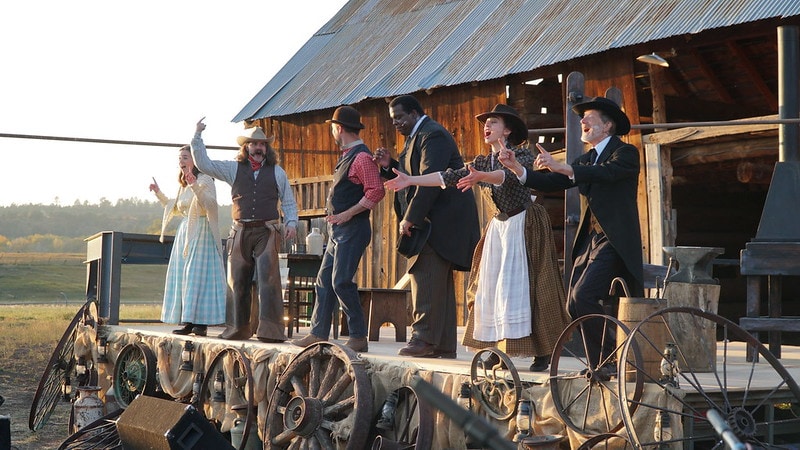
It’s a movement co-led by ranchers and artists, many of them retirees from the rat race, or newcomers fleeing fire-ravaged coastal areas. The collaboration is worth noting since, even if so far, there haven’t been any shootouts; there has been plenty of hollerin’ over what constitutes correct land use and water rights, pitting old comers against the newbies. Still, the shared vision is that the opera house will become a thriving performing arts and community center, a small business incubator, and all-around place where differences can be put aside and friends and enemies alike can come together, learn from one another, and focus on the future, while not forgetting their past, shared or not.
Enter into this fray the Washington-based Opera Lafayette, which earlier this year was set to premiere its Old Westernized version of The Blacksmith (Le Maréchal ferrant), an 18th-century French comic opera composed in the mid-1700s by François-André Danican Philidor with libretto by François-André Quétant. OL stage director and musical arranger Nick Olcott along with OL founding artistic director and violinist Ryan Brown, set their adaptation of the work in an 1890s American frontier town.
The premiere was intended as the restored opera house’s gala fundraiser opening night back in May, but then ol’ COVID came riding into town and busted up the whole shindig. Of course, the show must go on, and so it did, even if a little later than planned.
This past October, with audience members seated on hay bales placed six feet apart, the show premiered on the Reddert Ranch just outside Mancos, the working cattle farm that has been in Brown’s family for generations, and where he has spent nearly every summer of his life.
Turns out, Reddert Ranch is also home to an historic blacksmith shop that served as the perfect backdrop for two sold-out, late-afternoon performances, both of which were held on behalf of the Mancos Cattlemen’s Association and the Mancos Creative District. Each performance ended just as the sun was setting over the La Plata Mountains, not far from Mesa Verde National Park.
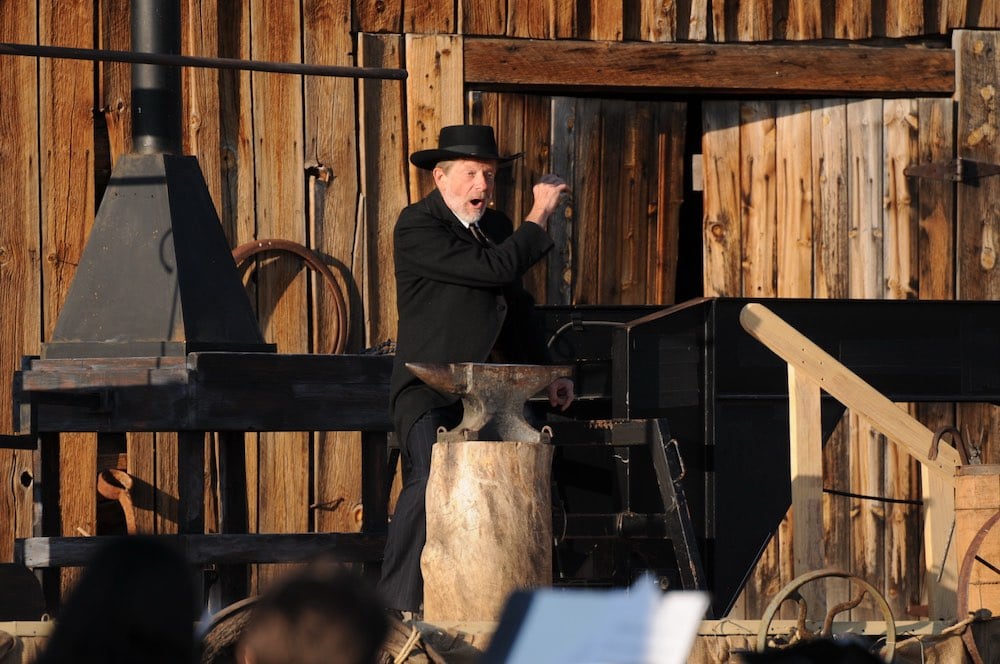
The Blacksmith is typical 18th-century comedic opera fare: father arranges marriage for his daughter, daughter wants to make her own choice in love, daughter wants man who also happens to be her aunt’s object of affection, a fight breaks out, daughter accidentally “kills” their mutual paramour, chaos and comedy ensue, the dead comes alive, everyone sings about how they will now all live and love happily ever after.
Atypical is the use by Brown and his collaborator, Montana native Olcott, of about a dozen American folk tune classics, most of which were chosen from the Smithsonian’s Alan and John Lomax collection of iconic American songs.
“I worked for two summers a few years back choosing all of them (except two) from the Lomax book that was on my grandmother’s piano,” Brown said in an interview. “Nick identified and chose Jeannie with the Light Brown Hair, and Colorado Trail. I also chose Ghostriders for Adam to introduce the opening second Act aria, suggested the arrangement of Shenendoah, and even wrote a few of the new folk song lines, including the COVID arrangement of Careless Love. It was a collaborative enterprise between the two of us. Mainly I focused on the musical choices and arrangements and Nick focused on the verbal choices.”
So well-woven are the French opera conventions with the American folk strains that Olcott’s clever treatment of Ghostriders in the Sky, played hauntingly (yup, meant to say that) by guitarist Adam Gardino, sneaks up on you with its musical joke that turns a standard TV Western tune into a beguiling ballad. The warmth of both Brown’s fiddle and Doug Balliett’s contrabass gliding from one to the other of two old country styles from two different centuries sounded organic and correct, even if it was neither one nor the other. Gardino also played banjo, and all were accompanied by local community musicians Andrew Saletta, Alice Gausch, and Marilyn Kroeker, and Lynne Lewis on guitar, Erika Alvero on fiddle, and on banjo Nick Lawrence, who primarily accompanied the audience sing-alongs throughout the show.
Given that French comic operas constitute OL’s mainstay, The Blacksmith is the first production in the company’s 25-year history to be sung and spoken in English, certainly the first to include y’alls and “hosses” (horses). Other innovations included the use of natural sunlight (and thankfully, what appeared to be cloudless skies) and a set that wasn’t fabricated so much as adapted for use by scenic director Lisa Schlenker making her OL debut. And then, as is increasingly so for live vocal performances in COVID times, there was OL’s first time using remote stage direction from Washington by Olcott and OL assistant stage director Lisa Mion.
In simple, authentic costumes designed by Marsha LeBoeuf, also new to OL, the ensemble cast debuted their ranch-style singing after quarantining protocols had been met, and thus another first was recorded for posterity: an antiquities opera performed with participation from local Mancos musicians and audience members, artists, patrons, and cowboys alike who’d been entreated to sing along and complied.
Well, did it work? Yes and no, but yes.
Whether it “works” for you will depend on a number of variables. Are you open to how opera has to change to survive? Are you an audiophile first, operaphile second, or vice versa? Do you now listen to opera on headphones, good ones? Or, do you listen through the manufacturer-issued speakers on your laptop? Do you stream on your phone or your television?
I have studio-quality Sennheiser earphones, but I watched the show on a 12-inch laptop. Would my experience have changed much if I’d used the cinema-quality television in the other room? Probably, but The Masters previews were on and you get one guess which one my husband wanted to watch at the time I was reviewing this.
For me, the results of my digital set-up were neither good nor bad, but novel. The fidelity of each individual instrument and voice recorded was crystal clear, but apparently recorded straight from their respective microphones by filmmaker Jason Shafer and audio engineer Doug Eagle, which meant that ambient noises were next to nil, an effect that particularly during the spoken portions lent an intimate but not resonant quality. It’s a sound effect familiar to voiceover artists but not associated with opera. When humorous lines were delivered, however excellent the comedic timing, the lack of audience reaction, or any other noise, sounded to me like an animated cartoon without a laugh track, especially because the speech portions were exaggerated for effect, given that this is essentially vaudeville.
However, the actual quality of the audio production was excellent. How do I know? Because American baritone Joshua Conyers sang the role of Eustis, the preacher in his OL debut, that’s how.
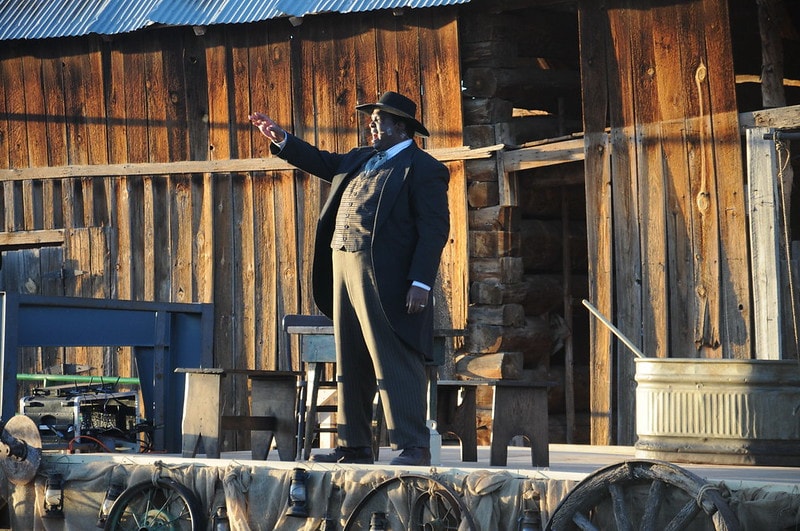
After Conyers’s performance this past March in Riffs and Relations, a performance given by the Washington National Opera Cafritz Young Artists Program at the Phillips Collection, I was convinced of his talent, and in particular of the evenness of his extraordinarily big voice. I have heard Conyers in a number of venues, but it was in the amplification of The Phillips Collection’s downstairs hall, with its open staircase where sound escapes, that things could get either weird or wonderful. Weird, they were not.
In this performance, hearing Conyers in all his bright bigness without any squashing of his top or hot distortion of his volume told me that the audio engineering was primo. For his part, Conyers not only sang with his usual consummate technique; he brought to the character role a flair for comedy that was every bit as good as his ability to communicate the most tender of art songs.
The show’s principals also sounded clear, and as is typically the case with earphones, rather intimate. OL regular the Québécoise-Acadienne light soprano Pascale Beaudin as Claudine sounded pretty and pristine, as always. Was her over-pronunciation of her “r’s” a stab at speaking our native “howdy-y’all,” or was it just a Francophone speaking and singing in Cowboy English? I don’t know, but it seemed to my ears a playful jab at the American twang Canadians like to intone when ribbing their southern neighbors. In any case, it was funny, and seemed organic to her character’s sly ways.
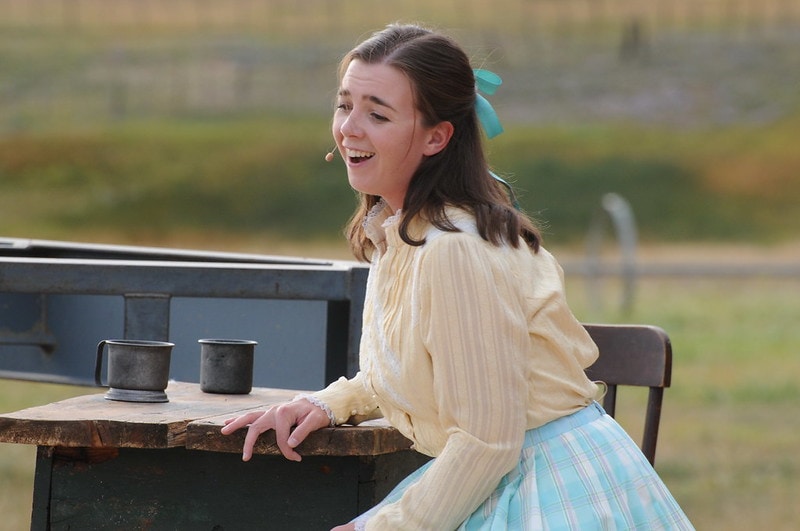
American soprano Sarah Schafer as the ingenue Jeannie brought sweetness to Olcott’s aching arrangement of the American folk tune Shenandoah into an elegy for the “late” Cody, sung by another CYAP alum making his OL debut, the emminently likeable and compelling American tenor Arnold Livingston Geis, who also flashed his comedic leather with ease. The young lovers’ duet of Olcott’s setting of Down in the Valley was comforting, frankly. How many of us who came of age when public schools in America taught us to square dance, play the recorder, and read music as a matter of course, learned to love that song? And if not, the arrangement was so utterly American sounding, you can’t help but sing or hum along. It made the opera feel indigenous, and natural to the nascent American operatic canon.
Rounding out the cast was the eponymous blacksmith, Marcel, sung invitingly by Québécois baritone Dominque Côte, who charmed me with his Irish-sounding interpretation of how a frontiersman would speak and sing, since indeed, much of the West was settled by Gaels. American tenor Frank Kelley was Slim MacBride/Banjo. Despite this being his OL debut, Kelley is a veteran performer who reminds me of actor John Hawkes: grizzled and stern, but reliable in whatever role he’s given, and always with an underlying humanity.
Remote direction is now just business as usual in the compulsory online age of opera, and there was never any reason to think Olcott and Mion wouldn’t master it, although I felt sad for them that for COVID-related reasons they were denied the opportunity to experience their work’s immediate impact on a live audience.
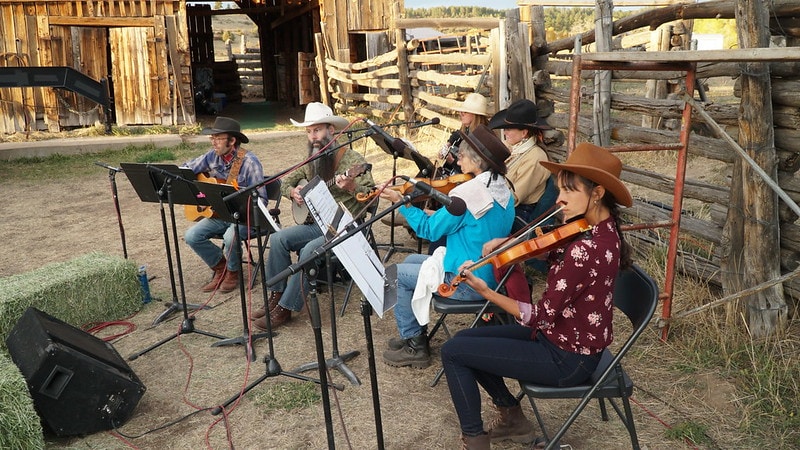
Which brings me back to my qualified assent as to whether the streaming version of their opus succeeded. For some, the absolute focus on the cast’s voices might be preferable, and so yes this worked. For my part, I missed hearing the reaction of others as the show unfolded. Because it was being performed for a crowd whom Brown told me included many first-time operagoers, it would have been meaningful to know how they responded, whether and how much they were engaged. The absence of this feedback made me realize the value of community in opera, something I already believed in but understood all the more when it was lacking.
That being said, striking an audio balance that serves the artists and an audience of one or many should not be an insurmountable task. Neither should approaching the video more contextually such as inserting B-roll of the stunning natural scenery before and after the show, or panning out more to show the stage amid the mountains while the singers do their thing. But, since this actually was everybody’s first rodeo, so to speak, thinking differently about how to approach the re-ride is certainly possible.
The quality of the music and performance was what I tend to expect from Olcott and Brown: superb. As for the effect of their work, it seemed to be positive, since as the cast took its bows, the camera did pan back to show the audience applauding gladly. Strains of them singing and dancing along to the reworking of Careless Love also seemed enthusiastic, though faint in the aforementioned audio mix.
Although Brown demurred in an interview to affirm or deny whether his opera had outright helped heal the divide in his mountain town, he did acknowledge the feedback from The Blacksmith attendees was overwhelmingly positive, and described other opera projects he is hatching to more directly address what he called “hot-button issues” on the minds of his fellow Mancosians.
The guitarist Lewis said in that same interview, “Everyone was all smiles and happy about what they were there for. Yeah, there’s a unity there. Not that it’s permanent, but it’s the kind of thing we need.”
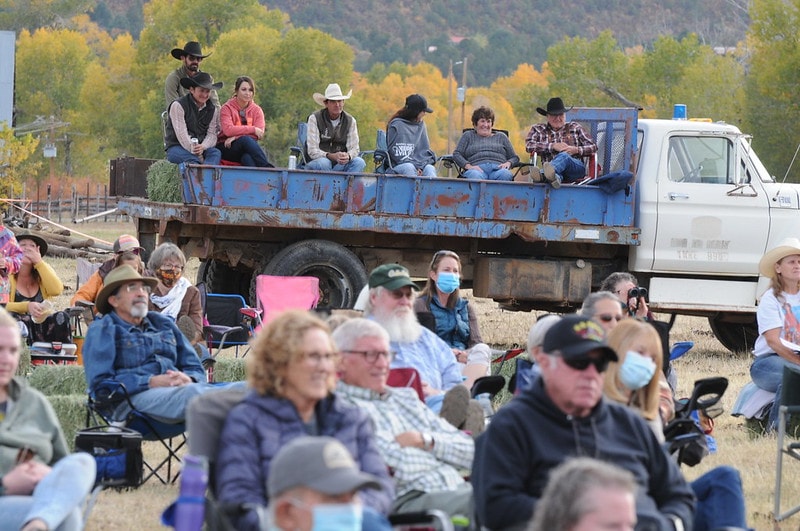
In that way, of course The Blacksmith was a success. Anytime opera demonstrates its power to tell stories that show how rifts can be mended, even if it’s with humor and silliness, there is the opportunity for us to remember what is possible once we put aside our differences: peace and prosperity.
Tickets and other information for Opera Lafayette’s online production of Philidor’s The Blacksmith (Le Marchant férrant) are available here. A live, one-time event on November 15, 2020, 2:00 p.m. (EST), includes a pre-show discussion with Maestro Ryan Brown, a virtual screening of the show, and a post-performance conversation with the artists. On-demand access to the show runs from November 16 through November 29, 2020.
The show is expected to run live in 2021 with March dates to be announced for the Terrace Theater at the Kennedy Center in Washington. It is expected to run on June 21, 2020, at El Museo del Barrio in New York City.
Running time: Approximately 90 minutes.





A marvelous, highly informative article. I love that you include the historical context of opera houses in the old west!